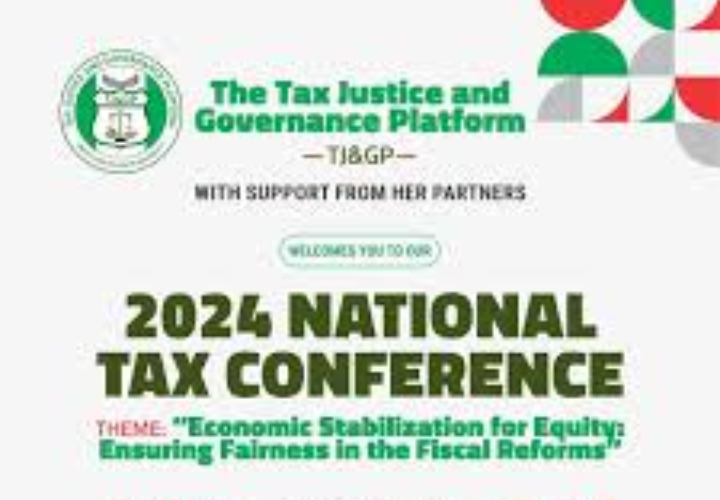
By Miriam Humbe
The Tax Justice and Governance Platform (TJ&GP), comprising 19 State platforms and the steering committee members rose from its National Tax Conference with a 10-point communique saying the timing of the Federal Government’s VAT increase is considered problematic given the current inflation rate exceeding 30%.
The conference also had 12 recommendations, among them was that the tax system be made more progressive to ensure that all taxpayers especially big businesses and high-net-worth individuals pay their fair share of taxes.
While scrutinizing the potential and current economic impact of President Bola Tinubu’s tax reforms, the conference also featured presentations, panel and interactive sessions, on the Economic impact of Recent Reforms on Nigerians and Coping Mechanisms; The Effect of the Removal of Fuel Subsidies and Naira Floatation Policies on
Nigerian Women and Girls and findings from a critical review of the Nigerian Tax Bills 2024.
The TJ&GP is compromised of Civil Society Legislative Advocacy Centre (CISLAC) and 19 State platforms and the steering committee members including Oxfam Nigeria, ActionAid,
Christian Aid, the Nigerian Labour Congress (NLC), International Budget Partnership (IBP), Centre
for Democracy and Development, (CDD) and Civil Society Legislative Advocacy Centre (CISLAC) which serves as the Secretariat.
Organized annually, the 2024 National Tax Conference, themed: Economic Stabilization for Equity: Ensuring Fairness in Fiscal Reforms, focused on enhancing equity in Nigeria’s fiscal and tax governance reforms, as
outlined by the Presidential Committee on Fiscal Policy and Tax Reforms (PCFPTR).
The purpose of the conference was to provide clarity on the reforms, and a platform for concerned stakeholders to share their concerns towards building
consensus for equitable tax and fiscal reforms in Nigeria.
This year’s conference convened 173 participants from government, civil society, labour unions, international organizations, professional associations, the business sector, informal economy, and the media—both in person and virtually.
Some of the government institutions in attendance included the Federal Ministry of Finance, the West Africa Tax Administration Forum (WATAF), the
Federal Inland Revenue Service (FIRS), National Orientation Agency, Fiscal Responsibility Commission, Ministry of Solid Minerals Development, Federal Capital Development Authority,
and National Identification Management Commission.
The event featured opening remarks from the TJ&GP Steering Committee, goodwill messages and keynote addresses by diverse stakeholders, including the Chairman of the Presidential Committee on Fiscal Policy and Tax reforms (PCFPTR), representatives from the Federal Ministry
of Finance, the West Africa Tax Administration Forum (WATAF), the Federal Inland Revenue
Service (FIRS), member organisations of the TJ&GP and other key organizations.
Key Discussions Updates on Fiscal Policy and Tax Reforms – Mr. Taiwo Oyedele, Chairman of the PCFPTR, provided updates on the ongoing fiscal and tax reform processes.
He highlighted progress, challenges, and
the rationale behind reforms such as VAT increases and the proposed 5% excise tax, emphasizing
the need for equity and sustainable development.
Key issues identified included but not limited to the following:
• The timing of a VAT increase is considered problematic given the current inflation rate exceeding 30%.
• The degree of involvement of all stakeholders in determining the classification of essential
and non-essential items in the proposed VAT reform.
• The need for data-driven evidence to justify both the equity and benefits of the proposed VAT sharing formular across the different tiers of government
• The need for the government to address the significant infrastructure gap in Nigeria
• Review of the technical framework governing tax incentives and waivers and their effective administration to ensure that they are being utilized efficiently and contribute to the country’s economic development.
• Inadequate emphasis on the economic growth facilitation component of the PFPTRC’ work to complement the ongoing reform on revenue transformation towards addressing
the prevailing poor business environment constricting the development and growth of
small and medium enterprises.
• Widespread concern about the feasibility of the proposed reforms addressing the issues of multiple taxation especially on micro and small-scale enterprises and the heavy tax
burden on vulnerable groups
• Low level of awareness on tax matters including understanding of the fiscal reform process particularly VAT, and their implications for different segments of society.
• The need for clear indicators for tracking and monitoring gender inclusivity in the proposed fiscal policy and tax reform.
• The need for transparency and accountability in tax revenue, and the linkage to effective public service delivery.
Recommendations:
The underlisted recommendations reflect the collective desire of all stakeholders to build a tax
system that fosters sustainable economic growth, promotes social equity, and ensures efficient
public service delivery through fair and effective taxation system in Nigeria:
1. The tax system be made more progressive to ensure that all taxpayers especially big businesses and high-net-worth individuals pay their fair share of taxes.
2. The proposed Personal Income Tax (PIT) rate risks eroding the relative gains from the minimum wage increase, as most low-income earners would exceed the N800,000 annual threshold. Rather than raising the rate for the second bracket to 15%, we recommend
capping it at 10%, considering the inflationary pressures on the cost of living in Nigeria.
This income group is already taxed at a 7% PIT rate when adjusted for the real value of their earnings. To offset the potential revenue shortfall from this adjustment, we propose
increasing the rates for the last income bracket (above 50 million Naira) to 26%.
3. The Presidential Committee should make available to the public, detailed data on the current VAT compliance rate, highlighting challenges leading to underperformance, and
proffering solutions for improvement.
4. The National Assembly to ensure the passage of the sections of the proposed tax bill that aim to harmonise taxes and digitize tax administration. In anticipation of this, we urge the
government to expedite the process of developing an effective implementation
framework and ensuring its effective use.
5. In collaboration with the Federal Inland Revenue Service (FIRS), the Presidential Committe should release a detailed framework outlining how VAT changes will be enforced, ensuring consistency and transparency across the system.
6. Government should actively engage in public education and awareness campaigns to clarify the goals of fiscal reforms, focusing on fairness and equity.
7. Provide platforms for wider citizens’ engagement in the reform process to ensure their concerns are addressed and integrated into final policies.
8. A portion of the additional revenue should be redistributed to benefit the lower tax brackets and the most vulnerable populations (Women, Girls and Persons with Disabilities).
9. Include clear indicators for tracking and monitoring gender inclusivity in the proposed fiscal policy and tax reform.
10. Advise against increasing VAT rates during a period of high inflation, as it may exacerbate inflationary pressures and reduce the purchasing power of Nigerians.
11. Review and expand the list of VAT exemptions to include all necessary items for basic living, such as energy sources (electricity, cooking gas, fuel) and food-related items, ensuring that they are accessible to all Nigerians.
12. Tax expenditure should be subject to legislation to ensure cost effectiveness and established framework to monitor milestones.
Conclusion:
The 2024 National Tax Conference concluded with a united call for reforms that align fiscal policies with equity and economic stabilization. These recommendations underscore the collective effort needed to build a fair and inclusive tax system that fosters sustainable development and equitable
growth for all Nigerians.
Signed by representatives from:
Tax Justice & Governance Platform,
State Tax Justice & Governance Platform, Enugu, Ebonyi, Imo,
Anambra, Akwa Ibom, Cross Rivers, Rivers, Bayelsa, Delta, Oyo, Ondo, Ogun, Osu an, Lagos, Taraba, Kaduna, Kano, Jigawa, FCT, Civil Society Legislative Advocacy Centre, CISLAC, Oxfam in Nigeria, International Budget Partnership, Christian Aid Nigeria, Action Aid Nigeria, National Youth Inclusive Initiative,
Good Governance Ambassadors of Nigeria, International Youth Network, Activista, Movement for a Socialist Alternative, Centre for Electoral Association of Nigeria, National Association of Small-scale industrialist, NASSI, Chartered Institute of Taxation of Nigeria, CITN, Meluibe Foundation of Nigeria, Nigerian Bar Association, NBA,
Right way for Women & Youth in Africa Development, International Budgetary Partnership, Social Action, Nigerian Labour Congress, NLC, Trade Network Initiative, National Association of Small Medium Enterprise, Centre for Quality Representative & Accountability, African Network for Peace Program and Development, Follow Taxes, Centre for Advocacy Transparency and Accountability Initiatives, Clement Isong Foundation, Youth for Development, OrderPaper, Open Government Partnership, Association of Nigerian Women in Business Network, Good Governance Team, Budgit Foundation, African Leadership Strategy and Transparency and Development Initiative.


